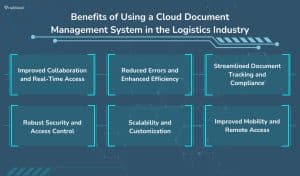Efficiency is critical in the dynamic logistics environment of today. Implementing a cloud document management system (DMS) can transform your business processes and help you maintain an edge over competitors. Let’s explore how these solutions may revolutionize your company by streamlining and eliminating errors from every procedure.
Seamless Collaboration with Real-Time Document Access
Think of a system where all parties involved have immediate access to critical logistics records, such as dispatch sheets, freight bills, and customs documentation, from any location at any moment. This is how a cloud document management solution may be powerful. It fosters unparalleled collaboration by enhancing transparency and expediting decision-making throughout the supply chain. Real-time sharing and collaboration inside a document management system can significantly improve logistical operations in the following key ways:
-
Enhanced Visibility and Transparency: All parties involved—logistics staff, clients, and partners—have access to current, real-time information with a cloud document management system. Ensuring alignment minimizes misunderstandings and delays.
-
Streamlined Coordination and Decision-Making: Teams engaged in logistics can exchange vital papers, such as freight bills and customs documentation when they collaborate in real time. This improves operational efficiency by expediting decision-making and streamlining supply chain collaboration.
-
Enhanced Responsiveness: Logistics workers can improve their agility and customer service in changing marketplaces by responding quickly to changes or concerns when they have rapid access to information.
-
Improved Collaboration: Partnerships throughout the supply chain are strengthened via real-time document exchange. Better problem-solving and collaborative improvements result from this, increasing the success of logistics as a whole.
-
Reduced Errors and Improved Compliance: Real-time document sharing lowers the possibility of expensive mistakes and legal problems by ensuring correctness and compliance.
-
Increased Productivity and Efficiency: In logistics, eliminating manual document processing and granting instant access to information improves productivity and operational efficiency.
Precision and Efficiency with OCR Technology
Mistakes in logistics can lead to significant losses. Incorporating OCR document management within a document management system (DMS) addresses this by drastically reducing data entry errors. Here’s how it enhances operations:
-
Automated Data Extraction
OCR technology simplifies data extraction from logistics documents like freight invoices, dispatch sheets, and customs paperwork. By reducing accidental errors, this automation guarantees the accuracy of the data utilized in all of your logistics processes.
-
Boosted Accuracy
OCR’s accuracy guarantees that every data extracted is accurate, lowering the possibility of expensive errors. Maintaining regulatory compliance and executing wise judgments in hectic logistics issues depend on accurate data.
-
Focus on Strategic Tasks
Logistics personnel can devote more time to strategic efforts instead of tedious paperwork by using OCR to automate routine data input chores. This change raises employee productivity as well as logistics businesses’ overall operational effectiveness.
OCR technology in document management systems changes how logistical documents are traditionally handled, improving productivity and reducing errors. This results in a logistics operation that is more efficient, compliant, and productive, which significantly improves production and productivity.
Streamlined Tracking and Robust Compliance
Keeping track of a gazillion tangible documents can be stressful. Document tracking and retrieval are made easier with a logistics document management system, and it also ensures strict adherence to industry rules. This efficient method lowers the possibility of lost paperwork and aids in keeping an extensive audit trail, both of them essential for regulatory compliance and client audits.
Uncompromised Security with Enhanced Access Control
The integrity of sensitive logistics information is paramount. Here’s how client document management software with robust access controls upholds the highest security standards:
-
Restricted Access to Sensitive Data: Only authorized individuals can access important logistics information thanks to access controls in document management systems. Critical data cannot be viewed or altered by third parties thanks to this selective access.
-
Compliance with Industry Standards: By implementing efficient access controls, logistics firms can adhere to industry security requirements and strict data privacy regulations. Organizations that exercise control over who has access to and may handle sensitive data can reduce the risk of data breaches and the fines associated with noncompliance.
-
Peace of Mind: Customers and logistics providers can feel secure knowing that sensitive data is protected by robust security procedures. The credibility and trust of the logistics sector depend heavily on this security confidence.
Improved access control in client document management software is essential for protecting private logistics data, ensuring businesses adhere to legal obligations, and upholding strict data security guidelines.
Customization and Scalability: Grow at Your Own Pace
Any logistics organization can have its document management system program tailored to its unique needs. These solutions readily integrate with your present workflows to handle dispatch sheets and customs paperwork, and they scale as your organization develops and changes.
Cloud Document Management System in the Logistics Industry

The logistics sector thrives on efficiency and precision, and integrating a cloud document management system brings transformative benefits:
-
Improved Collaboration and Real-Time Access
Cloud document management systems simplify sharing and collaboration on critical logistical documents like dispatch sheets, freight bills, and customs information. Directly accessing up-to-date information improves all parties involved and enhances communication and decision-making throughout the supply chain.
-
Reduced Errors and Enhanced Efficiency
Optical character recognition (OCR) technology allows these kinds of systems to automatically extract data from records, significantly reducing the amount of manual data entry and associated errors. This improves overall operational effectiveness and streamlines document processing.
- Streamlined Document Tracking and Compliance
Effective monitoring and retrieval functionalities of cloud document management systems guarantee compliance with rules and reduce the possibility of misplacing or losing crucial documents. In addition to increasing visibility, this feature aids logistics companies in keeping a thorough and reliable audit trail.
-
Robust Security and Access Control
Logistics requires the protection of sensitive data, so security is crucial. Cloud-optimized solutions meet high security and compliance standards because they provide strict user-level access control, limiting access to sensitive information to only authorized workers.
-
Scalability and Customization
The needs of logistics organizations for document management change as they expand. Because cloud-based solutions are so adaptable, businesses can modify the platform to meet changing requirements and growing business needs. These solutions are easily integrated into current workflows and can be customized to handle different types of logistics papers.
-
Improved Mobility and Remote Access
For logistics organizations with dispersed teams or those requiring remote collaboration with partners and clients, the capability to remotely access vital documents is a game-changer. Whenever and whenever they are, logistics professionals can remain connected and productive using cloud document management tools.
By leveraging a cloud document management system, logistics companies can streamline their operations, improve collaboration, reduce errors, ensure compliance, and enhance their overall efficiency and market competitiveness. This technological integration is not just an upgrade—it’s a crucial strategy for staying ahead in the fast-paced world of logistics.
Conclusion: Why Your Logistics Business Needs a DMS Now
Finally, incorporating a cloud document management system into logistical operations represents a significant step toward increased efficiency and competitiveness. With its unmatched quickness and precision, this cutting-edge technology offers more than just an improvement over conventional logistics management.
The main advantages are increased transparency and visibility. All stakeholders, from executives to ground staff, may view consistent, current information with real-time access. This consistency streamlines the whole supply chain by lowering misunderstandings and delays. Imagine a scenario where all team members always know what is required, eliminating costly miscommunications and boosting productivity.
Collaboration in real-time also improves decision-making. Teams involved in logistics may quickly respond to the ever-changing needs of customers and the market by sharing vital papers among themselves. This skill guarantees prompt and appropriate decision-making, maintaining responsive and seamless operations.
The agility of the system is revolutionary. It enables businesses to quickly adjust to new difficulties while preserving operational continuity and providing exceptional customer service even in stressful situations. With this response, customers are satisfied, and the company’s position in the market is strengthened.
Promoting document sharing helps with solid partnerships that are enhanced across the supply chain. Through creative problem-solving and process enhancements brought about by this partnership, the logistics operations become more resilient and successful.
OCR and other automated data extraction techniques minimize human error and guarantee regulatory compliance. This precision improves the integrity of data handling and is essential to avoid legal repercussions.
Ultimately, there is no denying that a cloud-based storage system increases productivity. Logistics operations become more efficient and economical by doing away with manual procedures and offering immediate access to crucial data. This efficiency increases the speed at which businesses may function and expand while also saving money.
Logistics firms are not only keeping up with the changes, but also leading the pace by implementing this breakthrough technology, positioning themselves to dominate a rapidly changing global market.



